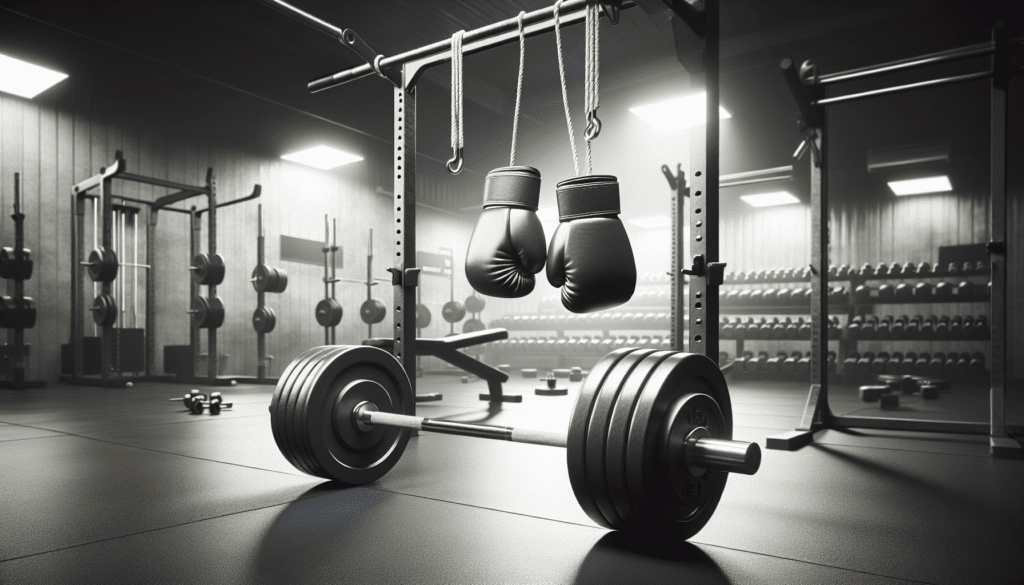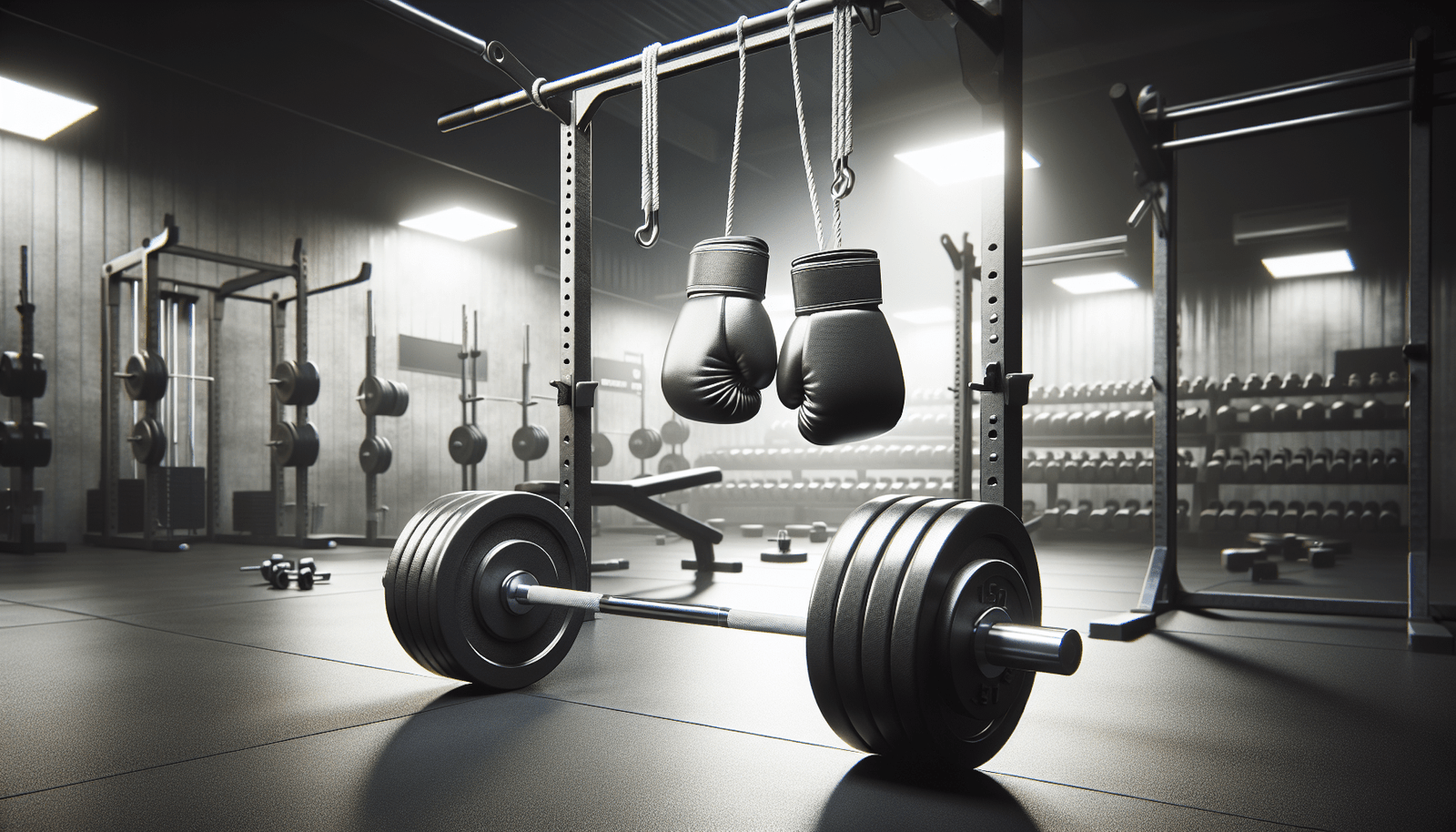Welcome to your beginner’s guide to weightlifting for MMA training! In this article, you will learn the basics of incorporating weightlifting into your MMA training regimen. From improving strength and power to preventing injury, weightlifting can be a valuable addition to your routine. Learn the essential exercises, proper form, and training tips to help enhance your performance in the octagon. Let’s get started on your journey to becoming a stronger, more skilled MMA fighter through weightlifting!
Are you ready to take your MMA training to the next level with weightlifting?
If you’re new to mixed martial arts (MMA) and are looking for ways to enhance your training, incorporating weightlifting into your routine can be highly beneficial. In this beginner’s guide, we’ll walk you through the basics of weightlifting for MMA training, including key exercises, considerations, and tips to help you get started on your journey.

Understanding the Benefits of Weightlifting for MMA
Weightlifting is a crucial component of MMA training as it helps improve strength, power, and endurance – all of which are essential for success in the octagon. By incorporating weightlifting into your routine, you can enhance your overall performance, reduce the risk of injury, and increase your longevity in the sport.
Did you know that weightlifting can also improve your mental toughness and focus, which are critical components of success in MMA?
Improving Strength
One of the key benefits of weightlifting for MMA training is the improvement of strength. Strong muscles are essential for generating power in strikes, takedowns, and submissions. By incorporating compound exercises such as deadlifts, squats, and bench presses into your routine, you can develop the strength needed to overpower opponents in the cage.
Enhancing Power
In addition to strength, weightlifting can also help enhance power, which is the ability to generate force quickly. Power is essential for explosive movements such as throwing punches, kicks, and performing takedowns. By incorporating plyometric exercises such as box jumps, medicine ball throws, and kettlebell swings into your routine, you can improve your power output and performance in MMA.
Building Endurance
Endurance is another key component of success in MMA, as fights can often go the distance and require sustained effort. Weightlifting can help enhance your muscular endurance, allowing you to perform at a high level for more extended periods. By incorporating high-repetition, low-weight exercises such as kettlebell snatches, farmer’s carries, and battle ropes into your routine, you can improve your endurance and conditioning for MMA.
Getting Started with Weightlifting for MMA
Now that you understand the benefits of weightlifting for MMA training let’s dive into how you can get started with a structured program. It’s essential to approach weightlifting with a plan to ensure you are targeting the right muscle groups and progressing safely and effectively in your training.
Are you ready to start your weightlifting journey? Let’s break down a simple yet effective program to help you get started.
Selecting the Right Exercises
When designing a weightlifting program for MMA training, it’s crucial to focus on compound exercises that target multiple muscle groups simultaneously. Compound exercises are more practical and functional for MMA as they mimic the movements used in the octagon. Here are some key exercises to include in your program:
| Exercise | Target Muscles |
|---|---|
| Deadlift | Hamstrings, Glutes |
| Squat | Quadriceps, Glutes, Core |
| Bench Press | Chest, Shoulders, Triceps |
| Pull-Up | Back, Biceps |
| Overhead Press | Shoulders, Triceps |
Structuring Your Workouts
To see progress in your strength and performance, it’s essential to structure your weightlifting workouts effectively. A beginner’s program should include three to four weightlifting sessions per week, focusing on different muscle groups in each session. Here’s an example of a simple weekly workout split:
- Day 1: Lower Body (Squats, Deadlifts, Lunges)
- Day 2: Upper Body (Bench Press, Pull-Ups, Rows)
- Day 3: Rest or Active Recovery
- Day 4: Lower Body (Deadlifts, Romanian Deadlifts, Box Jumps)
- Day 5: Upper Body (Overhead Press, Dips, Face Pulls)
- Day 6: Rest or Active Recovery
- Day 7: Rest
Progressive Overload and Recovery
In weightlifting, the concept of progressive overload is essential for continued progress and strength gains. Progressive overload involves gradually increasing the weight, reps, or sets of an exercise over time to stimulate muscle growth and adaptation. However, it’s crucial to balance this with adequate rest and recovery to prevent overtraining and injury.
Key Considerations for Weightlifting and MMA
As you begin your weightlifting journey for MMA training, there are several key considerations to keep in mind to ensure you are training effectively and safely. Let’s explore some essential tips and considerations for weightlifting in the context of MMA.
Focus on Functional Movements
When selecting exercises for your weightlifting program, prioritize functional movements that mimic the actions performed in MMA. Functional movements are those that engage multiple muscle groups and joints simultaneously and are more applicable to the motions used in fighting. Incorporate exercises like kettlebell swings, medicine ball slams, and sled pushes to improve functional strength and agility.
Prioritize Technique over Weight
While it may be tempting to lift heavy weights right from the start, it’s essential to prioritize proper technique over weightlifting. Focus on mastering the form and mechanics of each exercise to prevent injury and maximize results. Start with lighter weights and gradually increase the load as you become more comfortable with the movements.
Incorporate Mobility and Flexibility Training
Mobility and flexibility are critical components of MMA training, as they allow you to move freely and efficiently in the cage. Incorporate dynamic warm-up exercises, such as leg swings, arm circles, and hip rotations, before your weightlifting sessions to improve mobility and prevent injury. Additionally, consider including yoga or stretching routines to enhance flexibility and range of motion.
Listen to Your Body and Adjust Accordingly
In MMA training, it’s crucial to listen to your body and adjust your workouts accordingly to prevent overtraining and burnout. Pay attention to signs of fatigue, soreness, or discomfort and allow for adequate rest and recovery as needed. Be flexible with your training schedule and listen to your body’s signals to prevent injuries and setbacks.
Nutrition Tips for Weightlifting and MMA Training
In addition to your weightlifting routine, nutrition plays a vital role in supporting your performance and recovery in MMA training. Proper nutrition is essential for fueling your workouts, promoting muscle growth, and optimizing recovery. Here are some key nutrition tips to keep in mind as you incorporate weightlifting into your MMA training regimen.
Fuel Your Workouts with Quality Carbohydrates
Carbohydrates are your body’s primary source of energy and are essential for fueling intense workouts and training sessions. Prioritize complex carbohydrates such as whole grains, fruits, vegetables, and legumes to provide sustained energy throughout your workouts and aid in recovery. Aim to consume a balanced meal containing carbohydrates, protein, and healthy fats within two hours before and after your weightlifting sessions.
Protein for Muscle Recovery and Growth
Protein is essential for muscle repair, recovery, and growth, making it a crucial component of your nutrition plan for MMA training. Aim to consume high-quality protein sources such as lean meats, poultry, fish, eggs, dairy, legumes, and tofu to support muscle maintenance and growth. Consider incorporating a protein shake or bar post-workout to enhance recovery and promote muscle synthesis.
Stay Hydrated
Proper hydration is vital for maintaining performance, regulating body temperature, and supporting recovery in MMA training. Aim to consume an adequate amount of water throughout the day, especially before, during, and after your weightlifting sessions. Dehydration can impair your performance and increase the risk of injuries, so prioritize staying hydrated to optimize your training and recovery.

Conclusion
In conclusion, weightlifting is a valuable tool for enhancing your performance, strength, and endurance in MMA training. By incorporating weightlifting into your routine, you can develop the physical attributes necessary to succeed in the octagon, improve your overall fitness, and reduce the risk of injury. Remember to start slowly, prioritize proper technique, and listen to your body as you progress in your weightlifting journey for MMA training. Would you give weightlifting a try to take your MMA training to the next level? Get started today and reap the benefits of this effective training tool.

